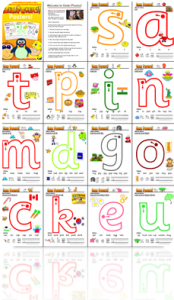 Quite a few people have written to ask for mini alphabet cards, especially for playing some of Mido’s games from earlier in the year.
Quite a few people have written to ask for mini alphabet cards, especially for playing some of Mido’s games from earlier in the year.
Well …. my Top Ninja Tip of the day is to set your printer options to print out 16 pages on one A4 sheet and use the Genki Phonics posters!
They come out really clear *and* as they also have the key vocab on there for each sound, it makes it much easier for the kids to figure out which is which. Plus they look really cool!
What do you think?
And what are your best games for cards like this?
Do let us know in the comments!
Be genki,
Richard
P.S. This month’s comment competition is nearly up, there’s a free CD (or CD download) to the writer of the comment that gets picked out of the hat before the 31st is over!



These cards would be great for a game I’ve been using for years to teach phonics. I call it Lucky Card. At the start I let one kid choose a letter of the alphabet as the lucky card, then we put cards for the whole alphabet face down on the table. the kids take turns flipping one card and we say the sound together, then they try to shout out English words that start with that sound. I use this with groups of 6-10, aged from 6 years to about 12 years. At the beginning I support them a lot by saying the sound, miming words they know, or saying words when they can’t remember any, but they get good at this game very quickly. With the bigger kids I add vowel variants and blends as well. This game is good because the winner is just ‘lucky’, not the best kid in class all the time, but everyone gets lots of practice.
Hello Richard,
Thank you for making the alphabet mini cards. Not only it saves paper but also made it easier for my little angels to play with.
Here’s the game I found online that I have been using for years and would gladly share it with everyone.
We call this game “Bang”
Material(s) needed: 1 pc of big can (teacher could just easily use an empty can, wash it and decorate it the way you want it)and the flashcards of the day
How to play:
(1) Place all the alphabet flashcards and a few “bang” flashcards in the can (* the bigger the can the better)
(2) Have the students take turns in reaching into the container and pull out a flashcard. Then, he/she says the sound out loud (*for younger ones) or name a word that begins with that letter (*for older kids) or construct a sentence (*for even older ones).
(3) If the child is able to say the sound/name a word/construct a sentence, he/she gets to keep the card. Otherwise, he/she has to return that card in the can.
(4) Continue taking turns, reading and collecting the flashcards.
(5) If a child pulls out a “Bang” card, he/she has to return all the cards in the can.
After 10-15 mins, whoever has the most card is the winner.
Enjoy the game >.<
Hi Richard. I tried Cristina’s game with a private student. Thanks alot Cristina for the wonderful idea It worked wonderfully! She allready knows the letters and is writing and reading simple words. I made the phonics posters into mini cards like you said and had them plastified. (a bit of an expense, but definitely a good idea. The first thing the 6-yrar-old girl did was to color the letters with an eraseable marker!) Anyways, We played together for almost 40 minutes on that one game, just picking out cards and thinking of words and sentences we could make with them. The “bang” cards were the trick to keep her interest because I would naturally keep more cards than her, but when I drew the “bang” card she foud it so funny that the teacher had to put all his cards back in the can 🙂
I’m going to try some of the Genki 2.0 worksheets with her next week. I’ll let you know how it goes.